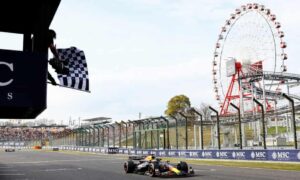
Max Verstappen shone in the spring sunshine of the Japanese Grand Prix’s new early season slot with a victory that served as salutary reminder he is firmly on course for his fourth world championship, and on this form he looks all but unstoppable.
The race has moved from its traditional place at the back end of the calendar for the first time since it was first held here in 1987 and the date has coincided with the Japanese sakura – cherry blossom – season. The trees have adorned the track with a riot of pinks and whites, offering a colourful backdrop for amateur snappers in their hordes here and TV producers alike. However hopes that there would be a matching new bloom of competition on the track were all too swiftly and decisively dashed on the glorious figure of eight circuit.
Verstappen, who had started from pole, won at a canter, trouble-free and unchallenged out front. So much so that it appeared it had not even inspired a superlative from the Dutchman who, as has been the case already this season, is taking the victories very much in his stride.
“Very nice, everything just went really well,” he said after climbing from the cockpit. “Pit stops, the strategy, it couldn’t have been any better.” He had, it seemed, barely broken a sweat on what he repeatedly described as a “nice” drive. Not quite the gladiatorial triumph of a champion yelling “Are you not entertained?” that F1 is trying to sell to the recent surge in new fans.
If there is any jeopardy for the world champion at the moment, he is untroubled by it. “Whenever I needed to go faster I could, whenever I needed to look after my tyres I could,” he said with the same calm, controlled and underwhelming understatement with which he dominated the race.
This was business as usual for Verstappen, and with a decidedly ominous air. Four races of a record 24-race season have been completed, the remaining 20 stretch long into the year and whereas for Verstappen this will have the pleasing trappings of a victory march, or a nice stroll as he might prefer it, it looks like something of a long old slog for his rivals.
The Red Bull driver comfortably beat his teammate, Sergio Pérez, into second place with a 12-and-half-second advantage in a race red-flagged on the first lap after Daniel Ricciardo and Alex Albon tangled on entering turn three, leaving both in the wall. After very heavy, dramatic impacts both drivers emerged unhurt.
The nearest challenger not driving a Red Bull was Ferrari’s Carlos Sainz in third and he was 20 seconds down the road. After Sainz had won at the last round in Australia, when Verstappen went out with a brake failure, there had been optimism that Ferrari were perhaps in the opening phase of mounting a fightback.
There was to be no such resurgence; instead consolidation of the control Verstappen has exerted over the season. He has won three of the races with ease and his consistency remains remarkable. Since the Miami GP last year he has been beaten only twice, both times by Sainz, once in Singapore in 2023 and then in Melbourne, a sequence of unprecedented dominance.
Suzuka plays to the strengths of the Red Bull, which is beautifully balanced through the fast corners, and the highly abrasive surface is mitigated by the car’s delicate handling of its tyres. Yet Verstappen remains very much in a class of his own. There is almost certainly more in the bank for him to draw on were it required. This season, as with last year and 2022, once he has consolidated a healthy lead, he can ease off from caning the car to the flag.
